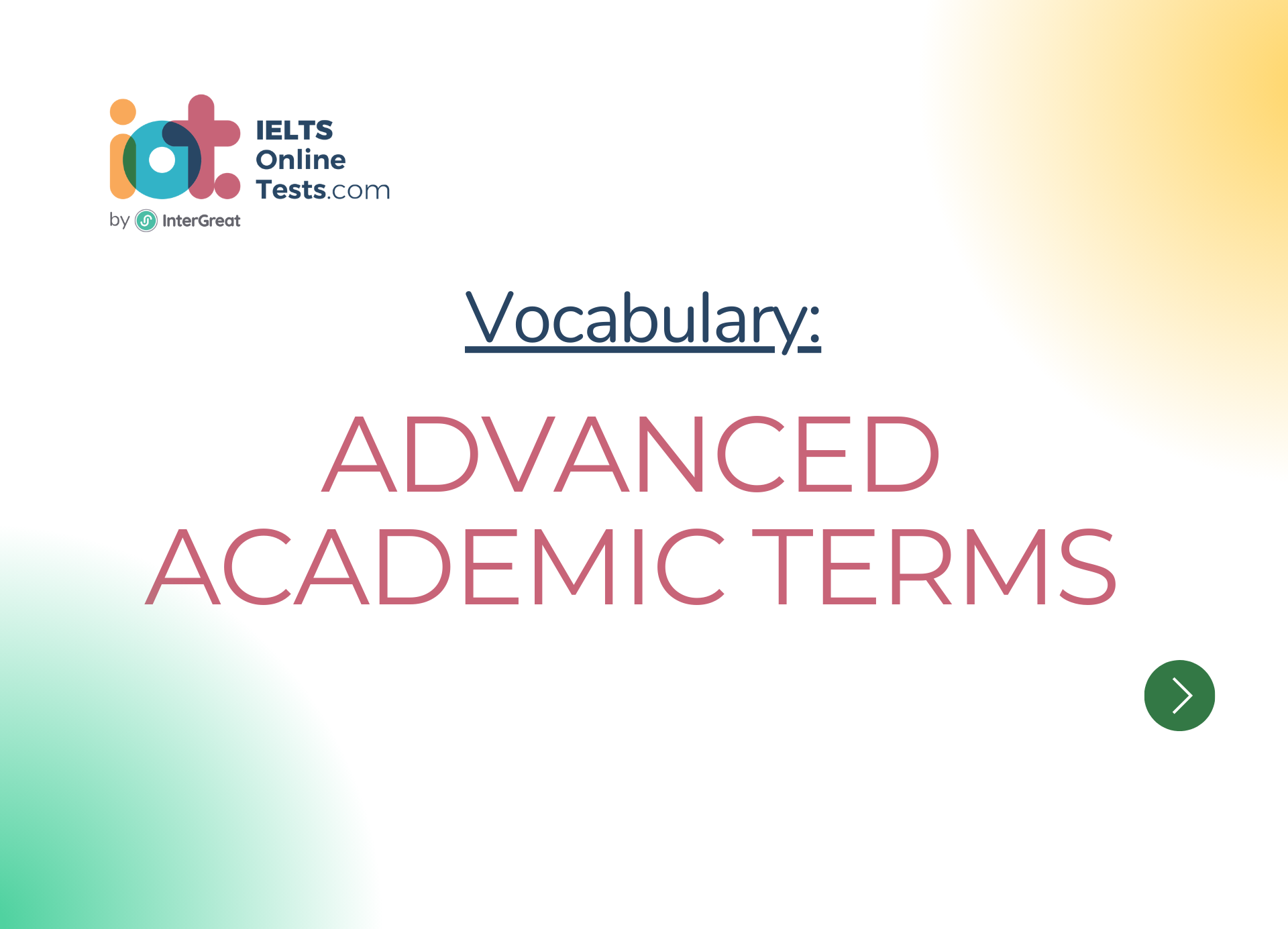
Advanced academic terms
Here's a comprehensive list of advanced academic terms for IELTS band scores 6.5-8.0:
Academic Rigor:
The level of difficulty and complexity in academic coursework or research.
Empirical Study:
Research based on observation and experimentation rather than theory or conjecture.
Hypothesis Testing:
The process of using data to assess the validity of a hypothesis.
Literature Review:
A comprehensive survey and evaluation of existing literature on a specific topic.
Peer-reviewed:
Research or academic work that has been evaluated by experts in the field.
Quantitative Research:
Research that focuses on gathering and analyzing numerical data.
Qualitative Research:
Research that emphasizes understanding human behavior and experiences through non-numerical data.
Theoretical Framework:
The underlying structure or conceptual model that guides research.
Empirical Evidence:
Information obtained through observation and experimentation.
Methodology:
The systematic approach and techniques used in research or study.
Statistical Analysis:
The process of interpreting and drawing conclusions from data using statistical methods.
Citation:
A reference to a source used in academic work, usually following a specific format.
Abstract:
A summary of an academic article or research paper.
Experimental Design:
The plan and structure of an experiment to control variables and ensure valid results.
Control Group:
The group in an experiment that does not receive the experimental treatment, used as a baseline for comparison.
Sample Size:
The number of subjects or data points used in a study or experiment.
Validity:
The extent to which a test, experiment, or research accurately measures what it intends to measure.
Reliability:
The consistency and repeatability of results or measurements in research.
Inference:
A conclusion or deduction based on evidence and reasoning.
Correlation:
A statistical measure of the relationship between two or more variables.
Significance Level:
The probability threshold used to determine if results are statistically significant.
Meta-analysis:
A research approach that involves combining and analyzing data from multiple studies.
Confounding Variable:
A variable that affects both the dependent and independent variables, potentially distorting the results.
Abstract Reasoning:
The ability to analyze and solve problems using conceptual thinking rather than concrete examples.
Dissertation:
A lengthy and in-depth research project, usually submitted as part of a doctoral degree.
Thesis Statement:
The main argument or point of a research paper or essay.
Academic Integrity:
Adhering to ethical standards in academic work, including avoiding plagiarism.
Critical Thinking:
The ability to analyze, evaluate, and form independent judgments based on evidence and reasoning.
Literary Analysis:
Examining and interpreting literary works, often focusing on themes, symbols, and literary devices.
Empirical Data:
Information obtained through observation, measurement, or experimentation.
Articulate:
Expressing thoughts and ideas clearly and effectively in speech or writing.
Discourse:
Written or spoken communication or discussion on a particular topic.
Efficacy:
The ability of an intervention or treatment to produce desired outcomes.
Pedagogy:
The methods and practices of teaching, especially as an academic subject or theoretical concept.
Praxis:
The practical application of theory or knowledge in a particular field.
Epistemology:
The study of knowledge, belief, and justification of beliefs.
Ontology:
The philosophical study of the nature of being, existence, or reality.
Metacognition:
Thinking about one's own thought processes, self-awareness of learning strategies.
Paradigm Shift:
A fundamental change in the way of thinking or approaching a problem.
Synthesize:
To combine different elements or ideas to create a coherent whole.
Exegesis:
Critical interpretation and analysis of a text, especially of religious scripture.
Didactic:
Intended to teach or instruct, often with a moral or ethical message.
Elucidate:
To make something clear or explain in detail.
Epiphany:
A moment of sudden realization or insight.
Lexicon:
The vocabulary or set of terms used in a particular subject or language.
Cognizant:
Being aware or conscious of something.
Derivative:
Coming from or based on something else.
Postulate:
To suggest or assume the existence of something as a basis for reasoning.
Propensity:
An inclination or natural tendency to behave in a particular way.
Sage:
A wise and knowledgeable person.
Remember that using advanced academic vocabulary can enhance your writing and speaking skills, showcasing your ability to handle complex academic concepts. Good luck with your IEL




